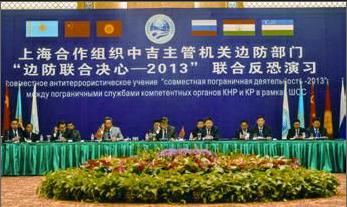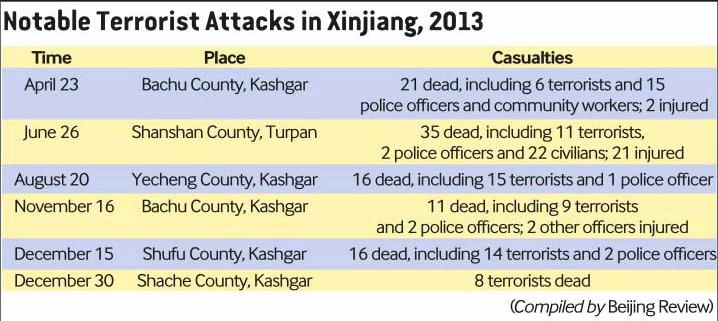Tackling Terrorism
2014-02-17ByYinPumin
By+Yin+Pumin


On the second to last day of 2013, Xinjiang police announced that eight had died and one more had been arrested during a raid on a group responsible for an “organized and premeditated terrorist attack” in the northwestern Chinese region.
The nine terrorists attacked a police station wielding knives at around 6:30 a.m. in Shache County in Xinjiang Uygur Autonomous Regions Kashgar Prefecture. They also lobbed explosives and set police cars on fire.
According to Xinhua News Agency, at least seven terrorist attacks and two riots happened in Xinjiang in 2013. Last December alone, there were two attacks in Kashgar, leading to 24 deaths, including that of two police officers.
“The surge of terrorist attacks is the results of religious extremism penetrating deeper into the region in recent years,” said Ma Pinyan, a senior anti-terrorism researcher and Deputy Director of the Ethnic and Religious Studies Center at the Xinjiang Academy of Social Sciences (XASS).
“If the authorities wish to stop terrorism in the region, they must take efficient measures to prevent the spread of extremist religious ideas,” Ma said.
Risks rising
The most notorious terrorist attack in China happened last year on October 28, when a jeep drove into a crowd at Tiananmen Square in downtown Beijing, killing two tourists and injuring another 40. The jeep was driven by Usmen Hasan from Xinjiang, whose mother and wife were also on board during the suicide attack. Police later identified the incident as a premeditated terrorist attack and investigations led to the detainment of five suspects.
“The attack showed that violent terrorist activities are no longer contained to Xinjiang and that terrorists are aiming to strike fear into the hearts of more and more people,” said Yang Shu, Director of the Central Asian Studies Institute of Lanzhou University in northwest Chinas Gansu Province.
According to Xinhua News Agency reports, police found gasoline, two knives and steel rods as well as a flag bearing religious extremist content in the jeep. “The evidence reveals that the attackers were under the influence of religious extremists,” Ma said.
Days after the Tiananmen attack, the East Turkistan Islamic Movement (ETIM) claimed responsibility and warned of future attacks.
In 2002, the United States designated the ETIM as a supporter of terrorist activities. In the same year, the UN added the group to its list of terrorist organizations and supporters that are associated with the Al Qaeda network, the group credited with the attack on the Twin Towers in New York City on September 11, 2001.endprint
In recent years, the ETIM, together with other groups associated with terrorism, separatism and extremism, have begun accelerating their penetration into Xinjiang. They promote religious extremism and instigate ethnic hatred through propaganda.
“Religious extremists are dangerous. They promise believers paradise as a way of coercing them into carrying out attacks,”said Pan Zhiping, Director of the XASSInstitute of Central Asia.
Pan stressed the difficulty of effectively stopping the spread of such ideologies. “In recent years, the Internet has made the spread of extremist religious materials easier and more convenient,” Pan said.
According to a report appearing in the Xinhua-owned Oriental Outlook magazine last November, more than 190 violent terrorist acts were carried out in Xinjiang in 2012, which local police sources say represented a sharp increase from the previous year, but no further details on the exact degree of the increase were given.
Official statistics show that more than 100 organizations or groups acting to endanger state security have been taken down annually by police forces since 2009, the weekly said.
Most people involved in terrorist activities in recent years were born in the 1980s and 1990s,and about 95 percent of them have only received a junior high school education or less. Furthermore, the number of terror-related crimes carried out by small groups or individuals has been on the increase, according to the report.
“Attacks planned by small groups, such as family members, and individuals brainwashed by religious extremist ideologies, rather than larger terrorist organizations, have made it more difficult for police to uncover such plots,”Ma said.
Mei Jianming, an anti-terrorism expert with the Beijing-based Peoples Public Security University of China, agreed that civilian participation in attacks has further complicated the fight against terrorism.
“They appear to be common people when they put down their weapons and its hard to identify them,” Mei said. “It is easy for them to flee as transportation is convenient nowadays.”
Terrorists are constantly changing their methods since China has strict controls over guns and other hazardous articles, said Li Wei, Director of the Anti-Terrorism Research Center at the China Institutes of Contemporary International Relations.
“Terrorists mainly used large knives during attacks in Shanshan County and Hotan City earlier last year, while they used a car and gasoline during the Beijing attack,” Li said. “The change of tactics has also led to anti-terrorism difficulties.”endprint
Searching for a resolution
In November last year, China declared plans to establish a national security committee. Experts believe the body will play an important role in countering rampant terrorism.
“It will have the power to coordinate government departments and organizations at the highest level so that they can respond to major emergencies and incidents that pose threats to national security, such as border conflicts and major terrorist attacks,” Li said.
Three months before the decision was made, in August, Chinas central authorities established a group headed by Guo Shengkun, Minister of Public Security, to lead anti-terrorism efforts.
“The group can respond to terror attacks, but it cant eliminate the source of terrorism,”Li said. “China desperately needs an organization, such as a national security committee, to develop long-term strategies to tackle the problem at its roots.”
Although most experts have high expectations for the upcoming national security committee, they stress that more work needs to be done to eliminate terrorism. In their opinion, early discovery and early warnings are crucial in the handling of terrorist threats.
Mei suggested building an anti-terrorism information network. “Sound intelligence gathering and judgment through the network can help effectively prevent attacks,” Mei said.
“An anti-terrorism law is also needed to beef up actions taken,” Li noted. He added that solving various social problems should also be included in the framework of anti-terrorism efforts. “Social problems should not be available to be used as excuses by terrorists to recruit members,” Li said.
After the United States withdraws its troops from Afghanistan in 2014, China and its neighbors to the west may face tougher security situations amid increased activity by extremists, experts warned.
Ruan Zongze, Vice President of the China Institute of International Studies, said that in 2014, the security situation in Afghanistan and its possible effect on regional stability are a major concern.
“The Taliban might take advantage of the withdrawal of U.S. troops. Moreover, Afghanistan is to hold its presidential election in May,” Ruan noted. He warned that the possible resulting turmoil may jeopardize security and stability in the surrounding area.
Wang Lijiu, an expert at the China Institutes of Contemporary International Relations, believes that the Shanghai Cooperation Organization (SCO), which groups China, Russia, Kyrgyzstan, Kazakhstan, Tajikistan and Uzbekistan, can effectively coordinate antiterrorism efforts between different countries in the region.endprint
During the 13th Summit of the SCO in Bishkek, capital of Kyrgyzstan, in September last year, leaders of member states reiterated that cooperation on security, which has been one of its key tasks since the SCO was founded in Shanghai in 2001, will remain the blocs top priority and their primary objective in the future.
After the Tiananmen Square attack, Chinese Premier Li Keqiang, when speaking at the 12th SCO Prime Ministers Meeting in Tashkent, capital of Uzbekistan, in late November last year, called again for increased security cooperation in the region.
“No security, no progress. This applies to any country or region,” Li said, adding that combating terrorism is the shared responsibility of all members of the SCO.
China has always been active in multilateral and bilateral anti-terrorism cooperation within the SCO framework. In 2013, it held joint antiterrorism drills with Russia and Kyrgyzstan.
Anti-terrorism cooperation between China and its other neighbors along the western border are also progressing.
In late October last year, Pakistan banned three extremist organizations that help plan attacks in Xinjiang, including the ETIM, Pakistani newspaper The News reported.
In November 2013, China and India also conducted their first joint anti-terrorism exercise in five years in southwest Chinas Sichuan Province.endprint
